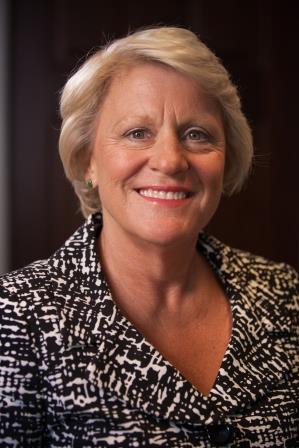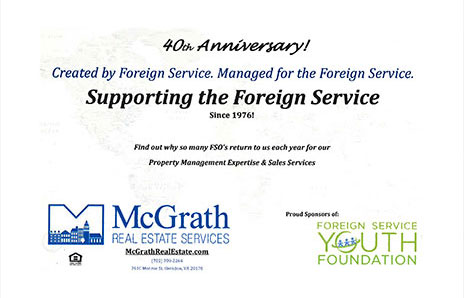Reaching Out
President's Views
BY BARBARA STEPHENSON

Last month, I presented the formulation the AFSA Governing Board and staff crafted to explain to those outside the Foreign Service family what we do: We deploy worldwide to protect and serve America’s people, interests and values. I welcome your thoughts and refinements, as well as your feedback on how this message lands when you use it with family, friends and elected officials.
Now I want to update you briefly on what we are doing to get that message out—and encourage you to pitch in.
I am delighted to report that the Una Chapman Cox Foundation has decided to partner with AFSA to enhance outreach efforts and support a multifaceted strategy to reach numerous target audiences.
For example, through a new partnership with the U.S. Institute of Peace, we will multiply the impact of the successful AFSA National High School Essay Contest with this year’s theme of “Building Peace through Diplomacy.” And we are reaching out to high school social studies teachers eager to have a member of the Foreign Service guest lecture.
We are also exploring ways to provide Foreign Service mentors to high school and college students involved in Model U.N. to help them role-play diplomats. And we are also exploring whether we can incorporate a segment on the work of the Foreign Service into the curriculum of AP history and government courses, which together reach nearly a million bright and aspiring students each year.
We will need similar strategies and partnerships to reach American businesses and other audiences.
All of our work is supported by the 2016 AFSA budget passed at the November Governing Board meeting. The budget is the key to better aligning AFSA’s resources behind the vision and the strategy I have laid out in these columns.
The 2016 budget is a model of fiscal responsibility, enhancing AFSA’s capacity to do focused outreach while keeping dues at last year’s level.
But fear not: the 2016 budget is a model of fiscal responsibility, enhancing AFSA’s capacity to do focused outreach that improves public perceptions of the Foreign Service while keeping dues at last year’s level. That’s right: no dues increase.
Finally, a word about this edition of the FSJ, which takes on the important and highly sensitive issue of mental health in the Foreign Service. For the past dozen years, the Foreign Service has been under extraordinary stress after having so many of our members deployed to war zones. But it doesn’t take war duty to take a toll.
As Acting State VP Bill Haugh notes in his AFSA News column, we will be healthier and more resilient individually and as an organization if we can acknowledge that the toll of our service is real. I congratulate the FSJ Editorial Board for venturing into this territory and opening up space for a conversation.
I remember talking to my doctor on my return from two back-to-back tours in the front office (as DCM and ambassador) of large embassies that followed two years as deputy coordinator for Iraq. Did he think the numbness in my hands, my inability to sleep soundly, and my short fuse with my family were due to some chemical imbalance?
The doctor smiled, “One-third of my patients are in the Foreign Service. You know what’s wrong with you? Stress. You need to exercise, eat right and take it easy. Meditate. Swim some laps.” That was just the advice I needed to get back on track. I was fortunate that, in my case, some basic lifestyle changes were sufficient.
I share that story with you in the hope that owning up to my own vulnerability will help weaken the FS taboo against admitting that we are human, that our extraordinary work makes extraordinary demands on us, and that we need to take care of ourselves—and each other.
As AFSA president, I pledge that AFSA will champion clarity, transparency and consistency in how MED and Diplomatic Security address mental health issues, and will work with management to lower the barriers to seeking help and to improve work environments.



